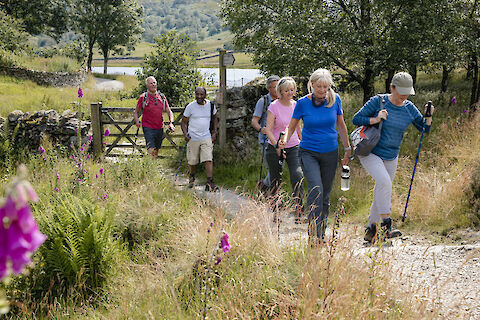
Staying active is essential for maintaining our physical and mental well-being as we age. Hiking is one such activity. It offers numerous health benefits for seniors, from improving cardiovascular fitness to reducing stress levels. However, it's understandable that you may have concerns about your abilities or safety while venturing out on the trails. We've got you covered! Lace up your boots, grab your walking stick, and let's look into safe and enjoyable hiking as a senior!
Select the Right Type of Trail
Before setting off on a hike, pick a trail that aligns with your abilities and comfort level. Consider factors such as distance, elevation gain, terrain, and accessibility. Start with shorter, flatter routes and gradually progress to more challenging hikes as your confidence and fitness improve. Local park and recreation websites, guidebooks, and online resources like AllTrails can help you find trails suitable for your experience and capabilities.
Warm-Ups and Stretches Matter
Warming up and stretching before a hike can make a world of difference in how you feel during and after your outdoor adventure. These activities increase blood flow and help prevent injuries by preparing your muscles and joints for the work ahead. Incorporate simple exercises such as ankle rolls, leg swings, and arm circles, followed by gentle stretches targeting your calves, hamstrings, and quadriceps. Set aside 10-15 minutes for warm-up and stretching before hitting the trail. Of course, consult your doctor before beginning any new exercise routine or activity.
Use Proper Footwear
Wearing the right footwear is essential for safe and enjoyable hiking as a senior. Look for shoes specifically designed for hiking with features such as good ankle support, a sturdy sole with ample grip, and breathable, water-resistant materials. Ensure that your shoes fit well, leaving enough room for your toes to wiggle, and break them in with short walks before tackling longer hikes.
Stay Hydrated
Staying hydrated is especially important on the trails, as dehydration can lead to fatigue, cramps, and dizziness. Carry enough water based on your hike's length and weather conditions. As a rule of thumb, aim for at least one liter of water for every two hours of hiking. Regularly sip on water throughout your hike, and familiarize yourself with the signs of dehydration, such as a dry mouth, headache, and dark urine.
Take Precautions Against Weather Conditions
Before heading out, always check the weather forecast and plan accordingly. Dress in moisture-wicking layers to help regulate your body temperature and adjust to changing conditions. If rain is a possibility, pack a waterproof jacket and extra socks. In hot weather, wear a sun hat, sunglasses, and sunscreen, and opt for early morning or late afternoon hikes to avoid peak sun exposure.
Be Aware of Your Surroundings
Staying on marked trails and paying close attention to trail signs reduces the risk of getting lost or encountering potential hazards. Bring a map, compass, or GPS device to help navigate your way and familiarize yourself with the route before starting. Keep an eye out for wildlife, unstable terrain, or other potential threats, and always give animals plenty of space.
Additional Safety Tips
When possible, hike with a buddy or group. You will enjoy the social aspect and having others around can assist during an emergency. Carry a fully charged cell phone and ensure someone outside your hiking group knows your planned route and expected return time. Lastly, pack a basic first aid kit and learn how to use its contents.
Companionship Services and More
Ensuring safe and enjoyable hiking as a senior might require a bit of preparation. However, it is crucial to fully enjoy its benefits. By following these tips, you can confidently explore nature while protecting yourself from potential risks. For seniors living in Chicago, Elmwood Park, Franklin Park, Harwood Heights, Melrose Park, River Grove, Schiller Park, and Stone Park, contact Senior Helpers Elmwood Park for assistance with daily activities and companionship. Contact us today to learn more about our services.